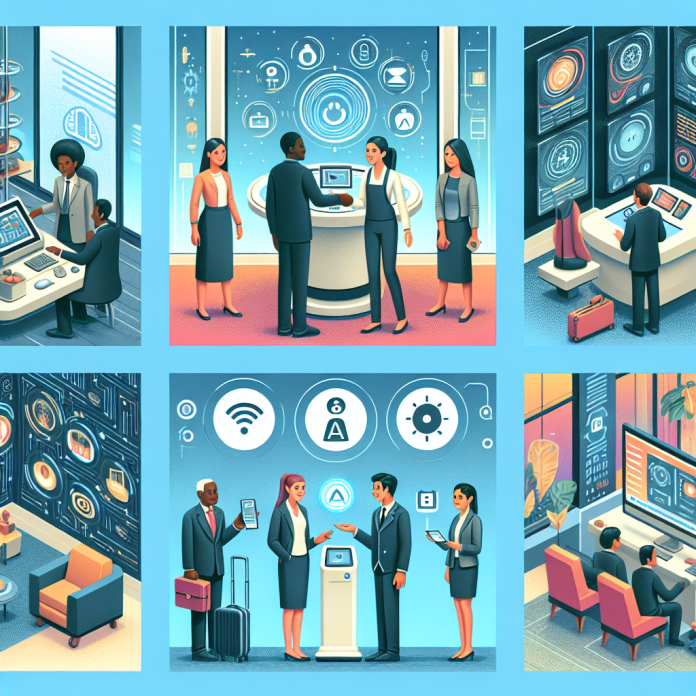AI Hospitality: Redefining Service
In today’s fast-paced world, technology is advancing at an unprecedented rate, transforming every aspect of our lives. One industry that has been particularly impacted by the rise of artificial intelligence (AI) is hospitality. From hotels to restaurants, AI is revolutionizing the way we experience hospitality, redefining service as we know it.
The Rise of AI in Hospitality
Imagine checking into a hotel and being greeted by a robot concierge that can check you in, provide recommendations for local attractions, and even deliver room service. This is no longer a scene from a sci-fi movie; it is a reality in many hotels around the world. The integration of AI technology in the hospitality industry has transformed the guest experience, making it more seamless, personalized, and efficient.
One of the key benefits of AI in hospitality is its ability to analyze vast amounts of data to anticipate and meet guest needs. By collecting and analyzing data from various sources, such as social media, booking history, and guest preferences, AI can create highly personalized experiences for guests. For example, AI-powered chatbots can engage with guests in real-time, providing them with personalized recommendations for activities, dining options, and more.
Enhancing Customer Service with AI
Customer service is a critical aspect of the hospitality industry, and AI is playing a crucial role in enhancing the guest experience. For example, AI-powered virtual assistants can provide 24/7 customer support, answering common questions and resolving issues in real-time. This not only improves the overall guest experience but also frees up hotel staff to focus on more complex tasks.
Moreover, AI can help hotels and restaurants to streamline operations and improve efficiency. For example, AI-powered systems can optimize inventory management, track customer preferences, and even predict peak times for bookings. By automating repetitive tasks and providing actionable insights, AI enables hospitality businesses to operate more efficiently and deliver a higher level of service to guests.
Real-Life Examples of AI in Hospitality
Several major players in the hospitality industry have already adopted AI technology to enhance their services. Marriott International, for example, has implemented AI-powered chatbots in its messaging platform to assist guests with booking, room service, and other inquiries. The chatbots use natural language processing to understand and respond to guest queries in real-time, creating a more personalized and efficient experience.
Another example is the use of facial recognition technology in hotels to streamline the check-in process. By scanning guests’ faces upon arrival, hotels can quickly verify their identity and provide a seamless check-in experience. This not only improves efficiency but also enhances security and guest satisfaction.
AI is also being used to personalize the guest experience in restaurants. For example, McDonald’s has implemented AI-powered kiosks that use machine learning algorithms to suggest personalized menu items based on customers’ past orders and preferences. By leveraging AI technology, McDonald’s is able to provide a more personalized and engaging dining experience for its customers.
Challenges and Ethical Considerations
While the integration of AI technology in hospitality offers numerous benefits, it also raises important ethical considerations and challenges. One of the primary concerns is the potential impact on jobs within the industry. As AI technologies continue to automate tasks traditionally performed by humans, there is a risk of job displacement and a decrease in the demand for human labor.
Moreover, there are concerns about data privacy and security in the use of AI technologies in hospitality. AI systems rely on vast amounts of data to operate effectively, raising questions about how this data is collected, stored, and used. Additionally, there is a risk of bias in AI algorithms, which can lead to discriminatory outcomes and reinforce existing inequalities.
Looking Ahead: The Future of AI in Hospitality
Despite these challenges, the future of AI in hospitality looks promising. As technology continues to advance, AI is poised to play an even greater role in redefining service and enhancing the guest experience. From personalized recommendations to automated operations, AI is revolutionizing the way we experience hospitality.
As we look ahead, it is crucial for businesses in the hospitality industry to embrace AI technology responsibly and ethically. By prioritizing data privacy, security, and fairness, businesses can harness the power of AI to create truly exceptional guest experiences.
In conclusion, AI is reshaping the hospitality industry, redefining service in ways that were once unimaginable. From personalized recommendations to streamlined operations, AI is revolutionizing the guest experience and setting new standards for service excellence. By embracing AI technology responsibly and ethically, businesses in the hospitality industry can unlock the full potential of AI and create truly unforgettable experiences for their guests. The future of hospitality is here, and AI is leading the way.

